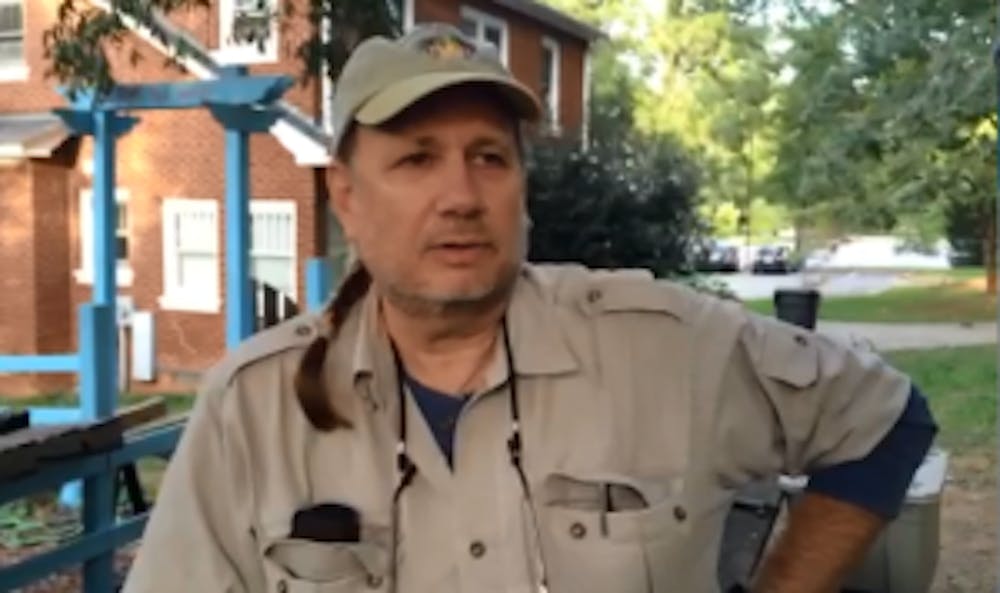Lecturer in English and Environmental Science Michael Strickland’s garden is many things: a classroom, a project, a practice in sustainability. But to Strickland, the Elon University Community Garden is more than that. It’s a labor of love, and it’s his home away from home.
Strickland runs the garden with the help of the Garden Studio course. He has been teaching English for 34 years and has been an environmental studies professor for 20. The two subjects seem worlds apart, but according to Strickland, the two overlap with each other in more ways than one.
“Environmental studies are an interdisciplinary field,” Strickland said. “There’s a science aspect to it, but there’s also philosophy, history, geography, religion. The environment and nature are often important subjects for writers. For me, there’s a big overlap in American writing.”
But Strickland’s connection to the environment didn’t start with teaching. He grew up on a farm, where he learned the ins and outs of farming.
“By way of my upbringing, I got involved in agricultural economics,” said Strickland, who studied sustainable farming and the rural sociology of “farm folks” at Naropa Institute in Boulder, Colorado.
The Elon Community Garden was created by Breanna Detwiler ’07 as a Honors Fellows thesis project, and Strickland’s studio class has been working on it since 2010.
“Strickland signs off all his emails with the quote ‘Put your good where it does the most,’ and that’s who he is as a person,” said senior and garden manager Alyssa Adler. “He puts in so much outside time and effort into making sure every student is succeeding and being the best they can be.”
Strickland’s effort applies not only to his students, but to his garden, which he has been improving since the class began.
“There were two major challenges we faced with the garden,” Strickland said. “The first was finding a space for the garden in a good location on campus. The farther from the center of action you move it, the less time students will spend in it.”
The garden is currently located behind the Sklut Hillel Center on College Avenue. According to Strickland, it was initially located across the railroad tracks but moved so students could have easier access.
Location is important for the garden — the two events it puts on during each school year, the Pumpkin Festival in the fall and the Strawberry Festival in the spring, draw in students who may not recognize the bright-blue fence behind the Hillel Center as something they’re allowed to use.
It also ensures that Garden Studio students, who are required to spend a minimum of 40 hours in the garden per semester, will log time outside of class caring for the garden.
Besides overcoming location challenges Strickland also had a few pesky critters to deal with.
“The second challenge was groundhogs,” he said. “Students would spend a week planting, and everything would get ripped up. We had rabbit problems before, but they were manageable.”
The resident groundhog, nicknamed Archie, is why the blue fence surrounds the garden.
Strickland’s class is designed to teach students about food production and sustainability through work at both the garden and the Elon Environmental Center at Loy Farm. But Strickland believes the class can be more than just a lesson — it can be a valuable part of sustainability at Elon.
“I think more students should be involved with food production on campus,” Strickland said. “The garden and [Loy] farm could provide more to dining halls. But for that to happen, changes would need to be made.”
Some of the changes Strickland has in mind include an expansion of Loy Farm to include more fruit — there is an heirloom apple orchard on-site, but it’s still young — and small animals like chickens. He also mentioned the possibility of a Living-Learning Community (LLC) centered around sustainability and farming that would take care of the garden and Loy Farm as part of their room and board.
The garden takes sustainability into account in everything it does. Its annual Pumpkin Festival, which took place Oct. 30, served food in reusable bowls and composts and recycled most, if not all, of its waste.
“There are so many things going on, so many pockets of intelligent people,” Strickland said. “The Office of Sustainability is understaffed but talented.”


